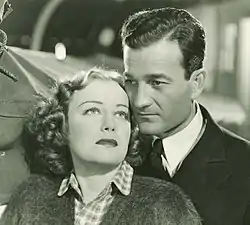Judith Allen
Judith Allen (born Marie Elliott, February 8, 1911 – October 5, 1996) was an American actress.[4]
Judith Allen | |
|---|---|
.jpg.webp) Allen in The Port of Missing Girls (1938) | |
| Born | Marie Elliot February 8, 1911 New York City, U.S. |
| Died | October 5, 1996 (aged 85) Yucca Valley, California, U.S. |
| Other names | Mari Colman |
| Occupation | Actress |
| Years active | 1933–1952 |
| Spouses | |
Early years
Allen was born Marie Elliot in New York City, and she grew up in Belmont, Massachusetts. She attended Leland Powers School in Boston[5] and gained acting experience with a stock theater company.[6]
.jpg.webp)

Using the name Mari Colman, Allen worked as a commercial model in New York for the Walter Thornton Modeling Agency.[7] That was where she was selected for a leading role in the film This Day and Age (1933).[6] The role led to her name change to Judith Allen. Robert S. Birchard wrote about the process in his book, Cecil B. DeMille's Hollywood, comparing it to "a comic sequence in David O. Selznick's 1937 production of A Star Is Born."[8]
Birchard related: "Mari Colman was subjected to the same treatment as DeMille, and Paramount tested long lists of potential screen names.... Somehow, the name ultimately bestowed upon her was Judith Allen."[8]
Personal life
Allen married wrestler Gus Sonnenberg in 1931 in New York City. They divorced September 23, 1933, in Reno, Nevada.[9] She married actor/boxer/singer Jack Doyle April 28, 1935, in Agua Caliente, Mexico and filed for divorce or annulment of the marriage, but also was quoted saying she hoped for reconciliation, and filed a $2 million suit against the Dodge heiress she said was trying to steal him away. [6] [10]
Filmography
- The Thundering Herd (1933)
- Too Much Harmony (1933)
- This Day and Age (1933)
- Hell and High Water (1933)
- Dancing Man (1934)
- She Loves Me Not (1934)
- Young and Beautiful (1934)
- Men of the Night (1934)
- Night Alarm (1934)
- The Witching Hour (1934)
- Marrying Widows (1934)
- The Old Fashioned Way (1934)
- Bright Eyes (1934)
- Behind the Green Lights (1935)
- The Healer (1935)
- Reckless Roads (1935)
- Burning Gold (1936)
- Beware of Ladies (1936)
- Git Along Little Dogies (1937)
- It Happened Out West (1937)
- Boots and Saddles (1937)
- Bill Cracks Down (1937)
- Navy Spy (1937)
- Texas Trail (1937)
- Telephone Operator (1937)
- Tough Kid (1938)
- The Port of Missing Girls (1938)
- Four Girls in White (1939)
- The Women (1939)
- Framed (1940)
- Sky Murder (1940)
- I Shot Billy the Kid (1950)
- Train to Tombstone (1950)
References
- "Wife Divorces Gus Sonnenbert". The Milwaukee Journal. United Press. September 24, 1933. Retrieved July 26, 2016.
- "Movita Castaneda, actress - obituary". The Telegraph. London. February 18, 2015. Retrieved July 26, 2016.
- "Judith Allen Asks Marriage Annulment". San Jose News. International News Service. April 25, 1945. p. 6. Retrieved December 27, 2021.
- Bradley p. 347.
- Wagner, Laura (Summer 2015). "Judith Allen: Freelancing on Poverty Row". Films of the Golden Age (81): 61–63.
- Harrison, Paul (October 13, 1937). "Is $2,000,000 Worth of Love Enough?". Hope Star. Newspaper Enterprise Association. p. 5. Retrieved July 26, 2016 – via Newspapers.com.
- "Model' Girls Are Always Very Much In Demand". The Brooklyn Eagle. August 12, 1944. p. 55.
- Birchard, Robert S. (June 29, 2004). Cecil B. DeMille's Hollywood. University Press of Kentucky. ISBN 978-0-8131-3829-9. Retrieved July 27, 2016.
- "Gus Sonnenberg and Actress Are Divorced". The Winnipeg Tribune. September 25, 1933. p. 13. Retrieved July 26, 2016 – via Newspapers.com.
- "Actress Files Annulment Suit". Salt Lake Tribune. International News Service. March 16, 1937. p. 14. Retrieved December 27, 2021 – via Newspapers.com.
Bibliography
- Bradley, Edwin M. (August 11, 2004). The First Hollywood Musicals: A Critical Filmography of 171 Features, 1927 through 1932. Jefferson, NC: McFarland. ISBN 978-0-7864-2029-2.